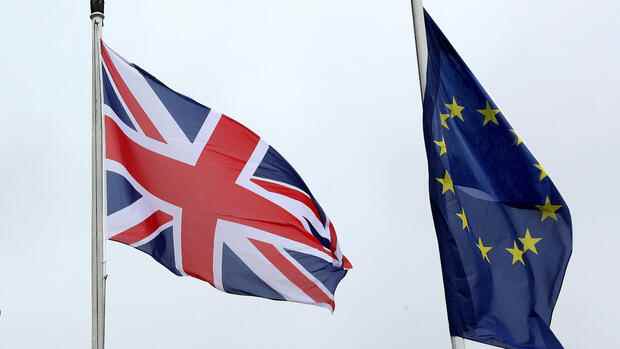The Brussels authorities accused London on Friday of violating essential parts of the so-called Northern Ireland Protocol.
(Photo: dpa)
Brussels In the dispute over Brexit rules for the British province of Northern Ireland, the EU Commission has initiated four new infringement procedures against the government in London. The Brussels authorities accused the United Kingdom on Friday of violating essential parts of the so-called Northern Ireland Protocol.
Proceedings can lead to an action before the European Court of Justice (ECJ) and result in a fine. The EU Commission is thus sending a signal to London that its patience has run out and that it will not give up in the dispute over the jointly agreed border controls.
Specifically, the allegations are that the Kingdom is not implementing a whole range of customs regulations and EU rules. These include, for example, controls on animal and plant transport from Great Britain to Northern Ireland, regulations on VAT and alcohol excise duties and the transmission of trade data. The EU is threatened with tax revenue losses, and the risk of smuggling is also increasing, the EU Commission said.
In the spirit of constructive cooperation, certain infringement procedures have been waived for more than a year. “However, the UK’s unwillingness to engage in meaningful discussion and the advanced process of passage of the Northern Ireland Protocol Act by the UK Parliament run directly against that spirit,” the agency said.
Top jobs of the day
Find the best jobs now and
be notified by email.
This means that a total of seven infringement procedures are pending against Great Britain. The EU Commission had already started two procedures in mid-June and resumed another. Britain now has two months to respond to the Blue Letters from Brussels.
With the new procedures, the EU Commission is reacting to the fact that the British House of Commons adopted a controversial draft law on the Northern Ireland Protocol in the third reading on Wednesday.
(Photo: Bloomberg)
The Northern Ireland Protocol is part of the 2019 agreement on Britain’s withdrawal from the EU. It stipulates that the province, which is part of the United Kingdom, will continue to follow the rules of the EU internal market and the European Customs Union.
Northern Ireland Protocol Bill
This was intended to prevent goods controls at the border with EU member Ireland in order to prevent the conflict between supporters and opponents of a unification of the two parts of Ireland flaring up again.
With the new procedures, the EU Commission is reacting to the fact that the British House of Commons adopted a controversial draft law on the Northern Ireland Protocol in the third reading on Wednesday. With the law, the British government gives itself the right to unilaterally override the international agreement.
The law still has to be passed by the second chamber of Parliament, the House of Lords. This should happen after the summer break. The law is viewed critically in the House of Lords, but as a rule the Lords do not oppose the will of the elected House of Commons.
>> Read here: Political adviser Fraser on Johnson’s successor: “Every applicant must prove his allegiance to Brexit”
The EU Commission sees a breach of international law in the Northern Ireland law. With her infringement proceedings she is reminding the government in London that the ECJ remains responsible for Northern Ireland. If the UK doesn’t give in, the worst-case scenario could be a trade war.
The two candidates to succeed outgoing British Prime Minister Boris Johnson, Foreign Secretary Liz Truss and ex-Finance Minister Rishi Sunak, have so far shown no signs of seeking a de-escalation in the dispute. As Brexit officer, Truss has actively driven the escalation in recent months.
The government in London wants to use the bill to force Brussels to reopen the agreement on the special status for Northern Ireland that was only concluded in 2019 as part of the Brexit treaty. The EU Commission strictly rules this out and instead wants to negotiate solutions within the framework of the existing agreement.
With agency material.
More: Great Britain needs more economic competence and less ideology. A comment.
